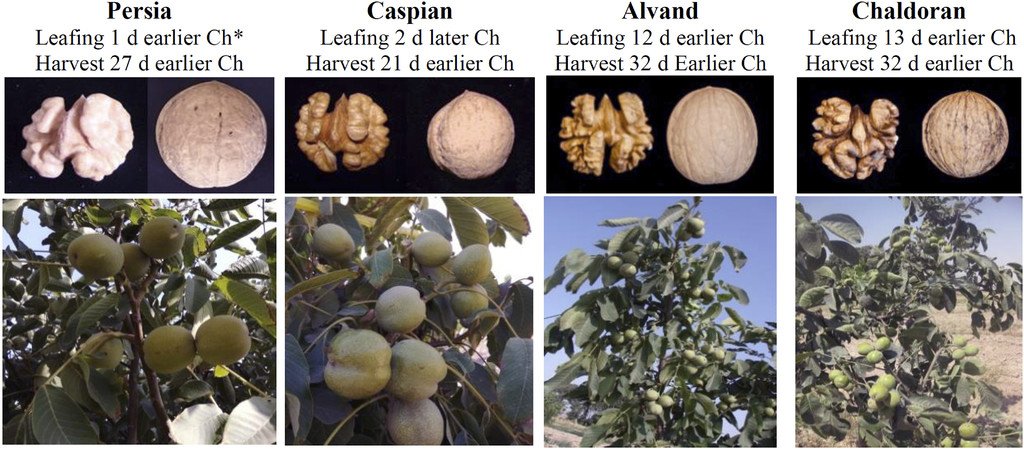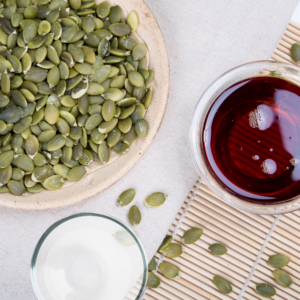Fesenjan, is a walnut-based dish prepared in Iran on special occasions. Surprisingly, walnut oil can also find its way into desserts! Some Persian sweets, like shirini (Persian cookies) or baghlava, make use of walnut oil to enhance the nutty richness of the pastries. It pairs especially well in recipes that call for walnuts, creating a harmonious, deep flavor.

In many parts of Iran, you’ll find walnut oil being sold in traditional bazaars, often in glass jars or handmade containers. The oil is cold-pressed, preserving its rich flavor and health benefits. Locally, it’s seen not only as an ingredient but also as a valuable health product—something that’s often passed down from older generations as part of cultural wisdom.
Upholding the tradition, we extract fresh walnut oil in-house using the most delicious Iranian walnuts. Our golden walnut oil is a walk down the Iranian mountain regions where the finest walnuts are famed, harvested, and hand-picked with reverence.
Nutritional Profile
Iranian walnut oil is a nutritional powerhouse, providing a range of healthy fats that are essential for maintaining optimal health. A rich source of omega-3 fatty acids, particularly alpha-linolenic acid (ALA), walnut oil supports cardiovascular health by promoting healthy cholesterol levels and reducing inflammation.
The oil also contains a variety of antioxidants, including vitamin E and polyphenols, which help protect the body’s cells from damage by free radicals. This makes walnut oil an excellent choice for protecting the skin and supporting overall cellular health. In addition, it’s rich in unsaturated fats, especially monounsaturated fat, which is known for its positive effects on heart health.
Here is a detailed look of its key nutrients:
- Omega-3 Fatty Acids: Essential for brain health and reducing inflammation.
- Vitamin E: A potent antioxidant that supports skin health and reduces oxidative stress.
Polyphenols: Plant compounds that contribute to its anti-inflammatory and antioxidant properties.
Uses
- Culinary Uses Walnut oil has a distinct, mild nutty flavor. It is used in a variety of dishes, adding depth to salads, dressings, and sauces. The oil is also drizzled over roasted vegetables, pasta, or grilled meats to enhance the taste. However, it is best used in low to medium-heat cooking because high temperatures can degrade its delicate flavor and nutritional properties. For those looking to add a sweet, nutty taste to their dishes, walnut oil can even be used in desserts, like drizzling over cakes or mixing into baked goods to add a subtle nuttiness. It’s especially popular in Persian cuisine, where it’s combined with pomegranate or yogurt to create rich, flavorful dishes.
Beyond the kitchen, Iranian families have long relied on walnut oil for its medicinal properties, using it for everything from skincare to digestive issues. Many local uses of walnut oil are passed down through generations, valued for their natural healing benefits.
- Skin Care: Iranian women, in particular, have used walnut oil as a beauty secret for centuries. It’s known for its ability to moisturize dry skin, soothe irritation, and even reduce the appearance of wrinkles. It’s commonly applied to the face and hands, often as part of a nightly skincare routine. Walnut oil’s antioxidant properties also help protect the skin from environmental damage, making it a natural remedy for maintaining healthy, glowing skin.
- Hair Health: Walnut oil is also popular in Iranian homes as a treatment for hair. Its rich nutrient content, including omega-3 fatty acids, is thought to help nourish the scalp and promote healthy hair growth. People use it to prevent dandruff or dry scalp, massaging it directly onto the scalp before washing their hair for a natural, hydrating treatment.
- Digestive Aid: In many rural areas of Iran, walnut oil is used as a home remedy for digestive issues. It’s believed to have a soothing effect on the stomach and intestines, helping to regulate digestion and alleviate discomfort. A spoonful of walnut oil is sometimes consumed on an empty stomach to improve overall gut health.
- Joint and Muscle Pain: The anti-inflammatory properties of walnut oil make it useful for alleviating joint pain or muscle aches. It’s often massaged onto sore areas to reduce swelling and promote healing. In many villages, walnut oil is combined with other local herbs to make an effective balm for joint pain or bruises.










Valoraciones
No hay valoraciones aún.